June 28, 1914
Assassination of Archduke Franz Ferdinand
The assassination of Archduke Franz Ferdinand precipitates the start of the massive armed conflict in Europe now known as the First World War.
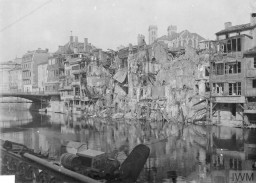
Before 1933
![Stretcher bearers carry a wounded soldier during the Battle of the Somme. [LCID: 2453747]](/images/small/c03190d9-0bcc-4c8d-97e7-45b36c603cc6.jpg)
Stretcher bearers carry a wounded soldier during the Battle of the Somme in World War I. France, September 1916. IWM (Q 1332)
—Imperial War Museum - Photograph ArchiveCountries across Europe struggled to recover from the devastation caused by World War I after it ended in 1918. This was a time marked by massive social and political change, revolution, and the establishment of new states. In this postwar environment, extreme nationalism, racism, and antisemitism found fertile ground. The Nazi and the Italian Fascist political parties, along with many other similar groups across Europe, emerged from this chaos to become visible threats to new and fragile democracies, including Germany's Weimar Republic.
June 28, 1914
Assassination of Archduke Franz Ferdinand
The assassination of Archduke Franz Ferdinand precipitates the start of the massive armed conflict in Europe now known as the First World War.

April 24, 1915
The Armenian Genocide
Ottoman authorities arrest 240 Armenian leaders in Constantinople and deport them east.
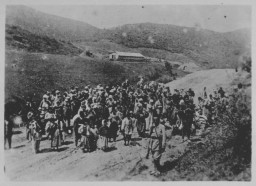
July 01, 1916
Battle of the Somme
This day saw the heaviest loss of life in a single day during World War I.
![Stretcher bearers carry a wounded soldier during the Battle of the Somme. [LCID: 2453747]](/images/small/c03190d9-0bcc-4c8d-97e7-45b36c603cc6.jpg)
November 3, 1918
Mutiny of German Sailors in Kiel
German sailors in Kiel revolt, and protests against World War I spread.
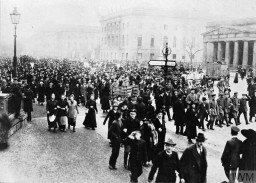
November 11, 1918
Ceasefire Ends Hostilities of World War I
A negotiated ceasefire ends the fighting of World War I when it goes into effect at 11am on November 11, 1918.

November 12, 1918
Women’s Suffrage is Declared in Germany
Germany’s provisional government declares support for women’s right to vote.
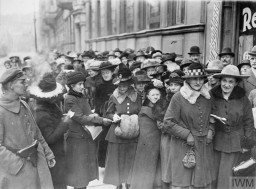
May 07, 1919
Treaty of Versailles Presented to German Delegation
The "War Guilt Clause" of the Versailles Treaty forces Germany to accept responsibility for initiating World War I.
![Allied delegates in the Hall of Mirrors at Versailles witness the German delegation's acceptance of the terms of the Treaty Of Versailles, ... [LCID: tl104]](/images/small/ff398e6d-3fc3-4622-9bf6-963c732cb282.jpg)
September 16, 1919
Adolf Hitler’s First Written Statement on the "Jewish Question"
Hitler writes a letter explaining his ideas on the so-called "Jewish Question."
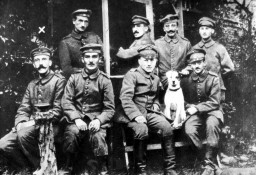
November 18, 1919
Hindenburg Spreads “Stab-in-the-Back” Myth
German Field Marshal Paul von Hindenburg spreads the myth that Germany only lost World War I because the military was “stabbed in the back.”
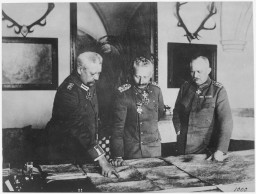
February 24, 1920
Nazi Party Platform
Adolf Hitler presents a 25-point plan at a Nazi Party meeting.
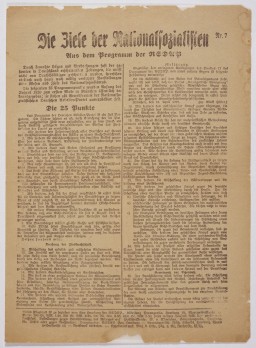
November 08–09, 1923
Beer Hall Putsch
Hitler and the Nazi Party attempt to overthrow the Weimar Republic.

February 27, 1925
Adolf Hitler Gives a Speech Upon the Reestablishment of the Nazi Party
Adolf Hitler delivers a speech about the reestablishment of the Nazi Party (NSDAP) and his role as leader.
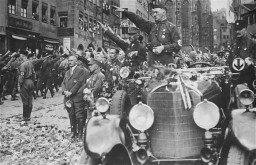
May 12, 1925
Inauguration of Paul von Hindenburg as President of Germany
German Field Marshal Paul von Hindenburg is inaugurated, becoming the last president of the Weimar Republic.
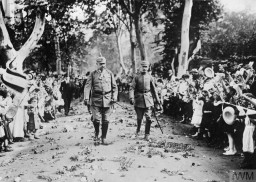
June 12, 1929
Anne Frank Born
Annelies Marie Frank, born on June 12, 1929, in Frankfurt, Germany, has become a symbol for the lost promise of the children who died in the Holocaust.
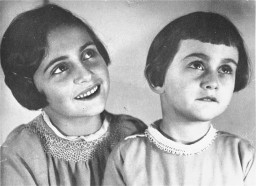
October 24, 1929
US Stock Market Crashes
The US stock market crashes and affects economies throughout the world.
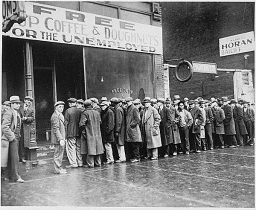
February 23, 1930
SA Member Horst Wessel Dies
Nazi stormtrooper Horst Wessel dies after being fatally shot.
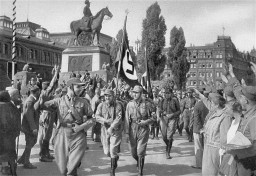
November 22, 1930
Eden Dance Palace Shooting
Nazis attack a leftwing group at a dance hall in Berlin and shoot three people in the crowd.
January 24, 1931
Bela Weichherz Diary Entry
A proud young father keeps extensive family journals.
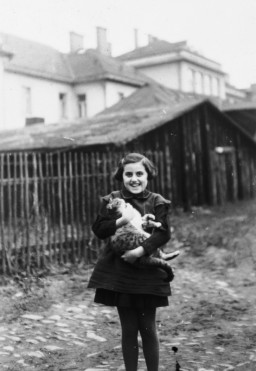
July 22, 1932
Hitler Campaign Speech
In a speech during a campaign rally in Waldenburg, Hitler attacks the Weimar Republic and pledges to dissolve the parliamentary system.
![Video still: Hitler campaign speech [LCID: dct0232h]](/images/thumb/802bf306-e609-4637-b227-09823028be97.jpg)
November 08, 1932
Franklin D. Roosevelt Elected President of the United States
Roosevelt wins the most votes in the American presidential elections.
![President Franklin Roosevelt sits with Eleanor Roosevelt in his study in the White House. [LCID: 02881]](/images/small/353ab792-8f04-49b4-aabe-2928173a32ab.jpg)
We would like to thank Crown Family Philanthropies, Abe and Ida Cooper Foundation, the Claims Conference, EVZ, and BMF for supporting the ongoing work to create content and resources for the Holocaust Encyclopedia. View the list of donor acknowledgement.